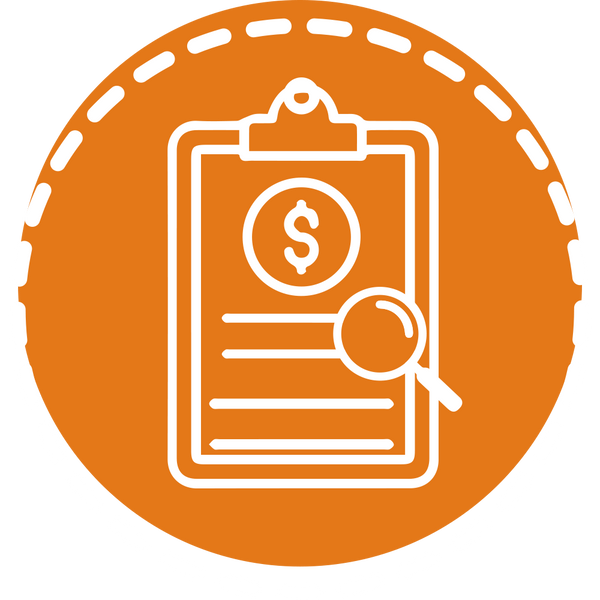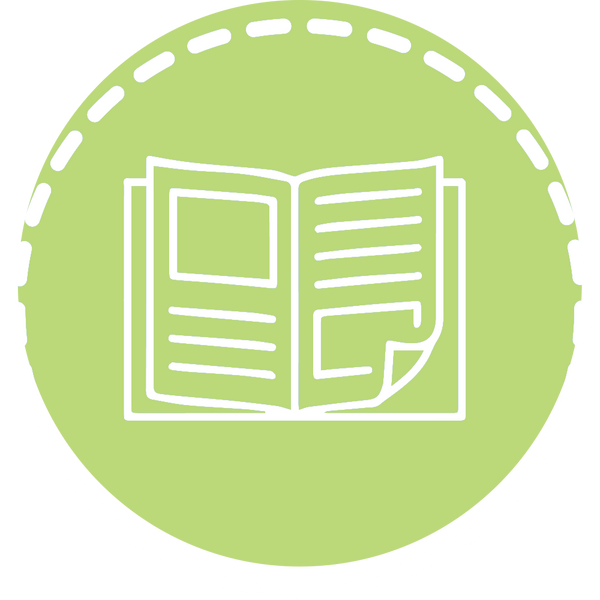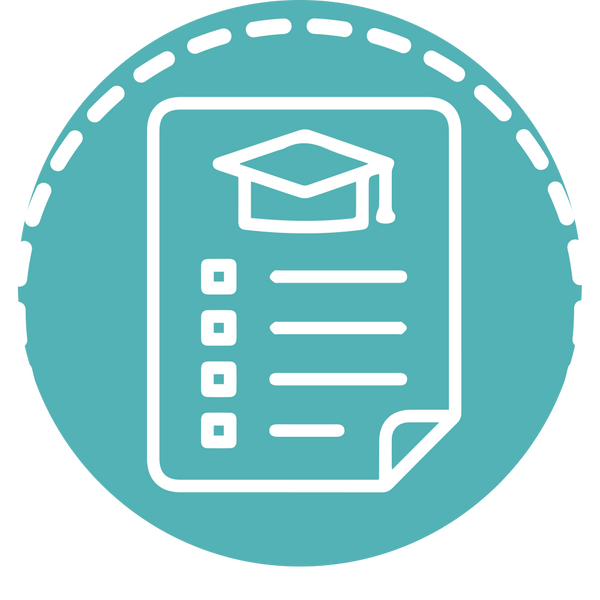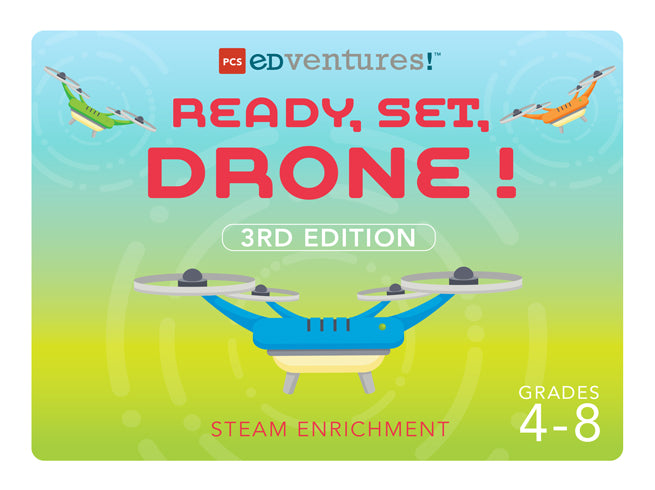
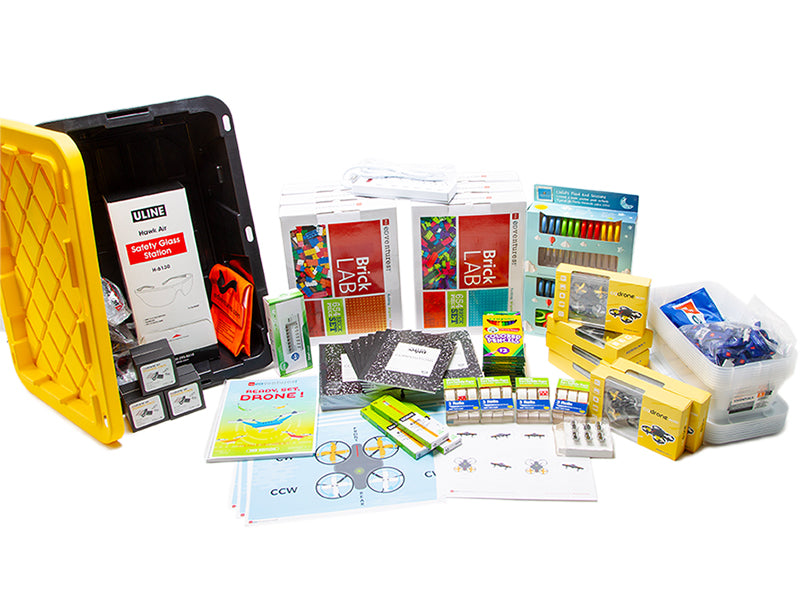
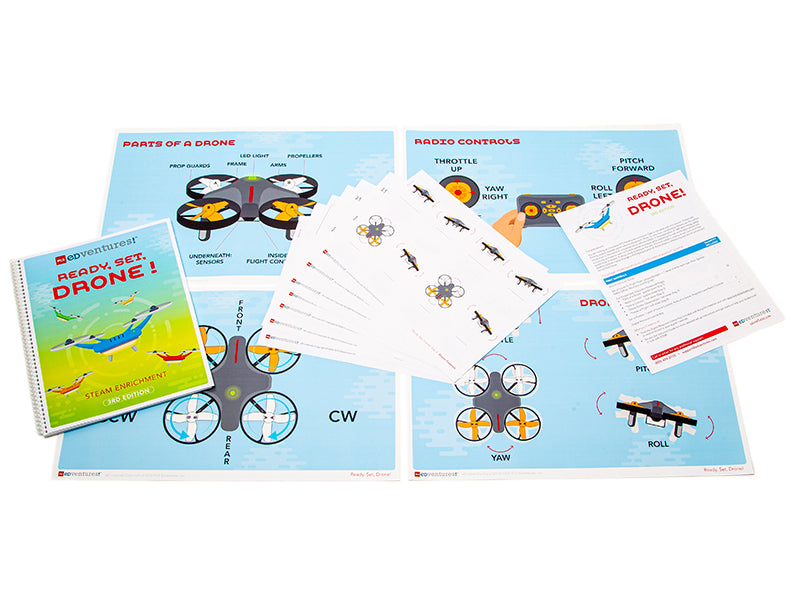
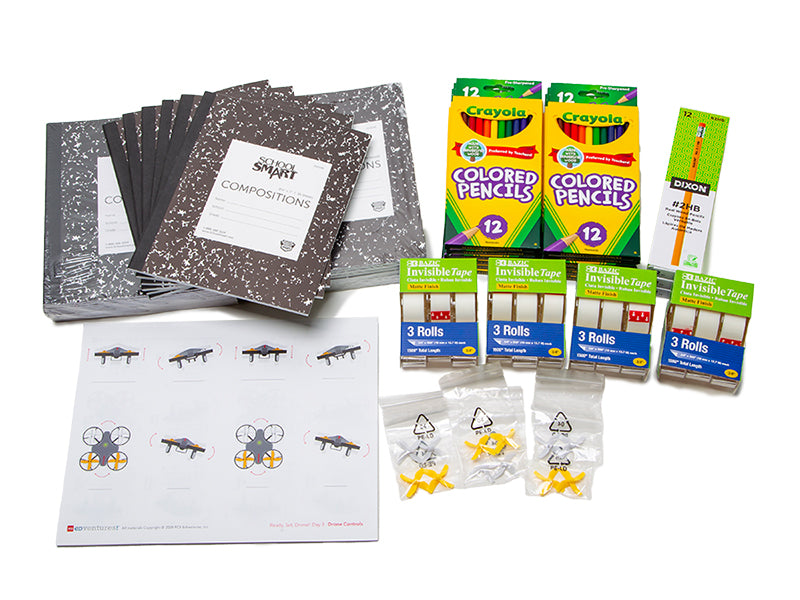
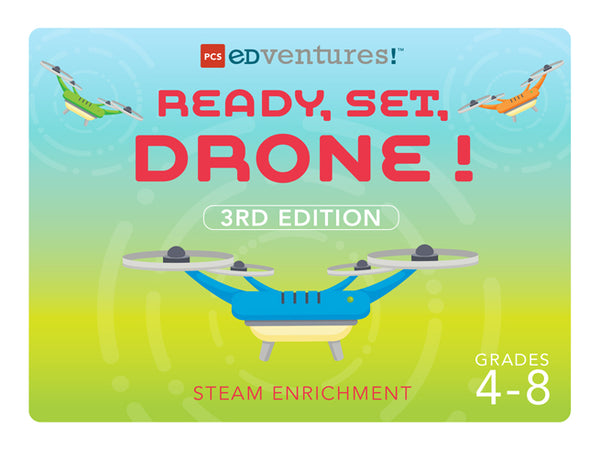
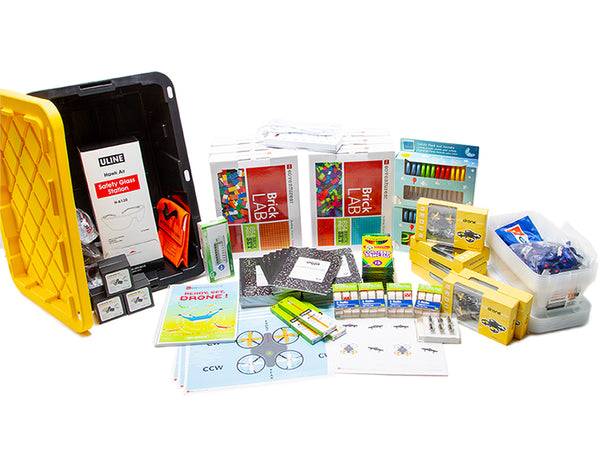
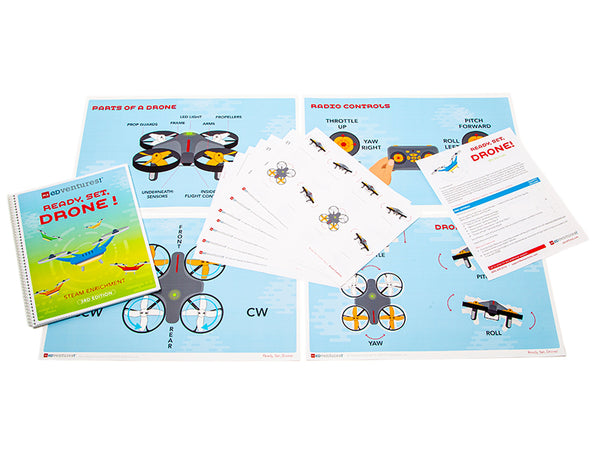
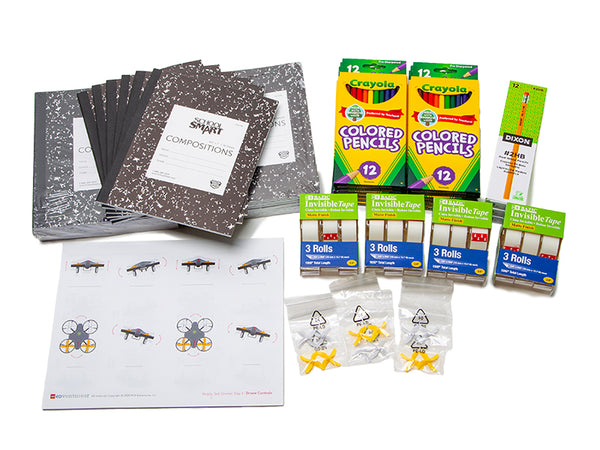






Ready, Set, Drone! 3rd Edition
- Price
- 2,995 USD
Mini Drones, Elevated!
Take to the skies with mini drones! Paired with thrilling, easy-to-operate aerial robotics equipment, these 12, one-hour, collaborative lessons are the perfect introduction to the world of unmanned aerial vehicles (UAVs). In this exploration of UAV technology, safety is a priority as students learn to fly and operate as a team while exploring the real-world applications and possibilities of drones. Putting critical thinking to the test, this multi-subject, inquiry-driven curriculum has students problem-solve through a thrilling exploration of drone physics, introducing learners to tomorrow's drone-filled future.
Grades: 4-8
Students: Up to 30
Contact Hours: 12+
Subject Targets:
Physical Science, Technology, Engineering Design, English Language Arts Connections
Reusability and Expansion:
- Refill Kit Available: This product offers affordable refill kits. See the materials tab for details.
- Fly Further with Add-On Kits: If you currently own Drone Designers 2nd Edition, you can easily expand your drone collection with the available Ready, Set, Drone! add-on package.
Settings & Tech Requirements
Recommended Settings:
- Summer Camps
- Classrooms
- Before & After-School Programs
- Homeschools
Tech requirements:
- Droneology Jr.: One device per student (digital curriculum is compatible with internet-connected Macs, PC’s, iPads, Android tablets
and Chromebooks.)
Curriculum Topics
Curriculum Topics:
- Essential Drone Knowledge
- Flight Safety
- Basic Piloting Skills
- Drone Physics
- Drone Rules & Ethics
- Real-World Applications of Drones
Professional Development
Product Orientation:
- Half-hour free webinar orientation for purchases of $500+
- One-hour free webinar orientation for purchases of $1000+
- Additional training available for purchase
Materials
Complete Program Includes:
Ready, Set, Drone! 3rd Edition comes with all of the supplies needed for 30 students to complete 12 one-hour activities:
- Instructor Guide: 1
- Printed Student Pages: 30 sets
- Printed Posters: 4
- Droneology Jr. Premium Digital Course: 1
- BrickLAB BrickPACKs: 6
- Brick Separator: 1
- Mesh Bag (for cleaning bricks): 1
- Small Storage Containers: 8
- Medium Storage Containers: 2
- Large Storage Container: 1
- #2 Pencils (12 pack): 3
- Batteries (rechargeable AAA): 12
- Battery Charger: 1
- Colored Pencils (12 pack): 12
- Composition Notebooks: 30
- Flight Team Lanyards: 30
- LiPo Batteries: 12
- LiPo Battery Multi-Charger: 3
- LiPo Safe Storage Bag: 1
- Mini Quadcopters: 6
- Mini Drone Battery Charger Packs: 6
- Pencil sharpeners: 6
- Safety Glasses: 30
- Scissors: 12
- Surge Protector: 1
- Transparent Tape Dispensers: 12
- USB Charging Cables: 6
- Access to the Digital Resource Portal
Curriculum Print & Digital Includes:
- Instructor Guide: 1
- Printed Student Pages: 30 sets
- Printed Posters: 4
- Droneology Jr. Premium Digital Course: 1
- Access to the Digital Resource Portal
Refill Kit Available:
Looking to use Ready, Set, Drone! with a new flight crew? This refill kit will get you back up and flying in no time!
- Printed Student Pages: 30 sets
- #2 Pencils (12 pack): 3
- Colored Pencils (12 pack): 12
- Composition Notebooks: 30
- Drone Motors (4 pack): 1
- Propellers (4 pack): 3
- Transparent Tape Dispensers: 12
Add-On Package:
If you currently own Drone Designers 2nd Edition, this add-on package is the perfect addition to build your drone collection!
The Ready, Set, Drone! add-on package comes with all of the supplies needed for 30 students to complete 12 one-hour activities with the drones you already have:
- Instructor Guide: 1
- Printed Student Pages: 30 sets
- Droneology Jr. Premium Digital Course: 1
- BrickLAB BrickPACKs: 6
- Brick Separator: 1
- Mesh Bag (for cleaning bricks): 1
- Small Storage Containers: 8
- Medium Storage Containers: 2
- Large Storage Container: 1
- #2 Pencils (12 pack): 3
- Colored Pencils (12 pack): 12
- Composition Notebooks: 30
- Flight Team Lanyards: 30
- Pencil sharpeners: 6
- Scissors: 12
- Transparent Tape Dispensers: 12
- Access to the Digital Resource Portal
Standards & Alignment
Habits of Mind:
16 thinking habits developed by Art Costa and Bena Kallick to empower students to succeed in a 21st-century learning environment.
- Applying Past Knowledge to New Situations
- Gathering Data Through All the Senses
- Managing Impulsivity
- Questioning and Posing Problems
- Remaining Open to Continuous Learning
- Taking Responsible Risks
- Thinking About Thinking
- Thinking Flexibly
- Thinking Interdependently
21st Century Skills:
A set of widely-applicable abilities essential for success in the information age.
- Communication and Collaboration
- Critical Thinking and Problem Solving
- Flexibility and Adaptability
- Information, Media and Technology Literacy
- Leadership and Responsibility
© 2019 Battelle for Kids. battelleforkids.org. All Rights Reserved. Battelle for Kids was not involved in the production of this product and does not endorse it.
Common Core State Standards for English Language Arts:
- CCSS.ELA-LITERACY.SL.4.1/CCSS.ELA-LITERACY.SL.5.1/CCSS.ELA-LITERACY.SL.6.1 Engage effectively in a range of collaborative discussions (one-on-one, in groups, and teacher-led) with diverse partners on grade 4-6 topics and texts, building on others' ideas and expressing their own clearly.
- CCSS.ELA-LITERACY.SL.4.2/CCSS.ELA-LITERACY.SL.5.2/CCSS.ELA-LITERACY.SL.6.2 Paraphrase portions of a text read aloud or information presented in diverse media and formats, including visually, quantitatively, and orally. / Interpret information presented in diverse media and formats (e.g., visually, quantitatively, orally) and explain how it contributes to a topic, text, or issue under study.
© Copyright 2010. National Governors Association Center for Best Practices and Council of Chief State School Officers. All rights reserved.
Next Generation Science Standards:*
- NGSS 3-5-ETS1-1 Engineering Design
- NGSS 3-5-ETS1-2 Engineering Design
- NGSS 3-5-ETS1-3 Engineering Design
- NGSS 4-PS3-1 Energy
- NGSS 4-PS3-2 Energy Transfer
- NGSS 5-PS1-1 Structure and Properties of Matter
- NGSS 5-PS2-1 Forces and Interactions
* Next Generation Science Standards and NGSS is a registered trademark of WestEd. Neither WestEd nor the lead states and partners that developed the Next Generation Science Standards were involved in the production of this product, and do not endorse it.
International Society for Technology in Education:
- ISTE 1d Students understand the fundamental concepts of technology operations, demonstrate the ability to choose, use and troubleshoot current technologies and are able to transfer their knowledge to explore emerging technologies.
- ISTE 2b Students engage in positive, safe, legal and ethical behavior when using technology, including social interactions online or when using networked devices.
- ISTE 7c Students contribute constructively to project teams, assuming various roles and responsibilities to work effectively toward a common goal.
ISTE Standards for Students, ©2016, ISTE® (International Society for Technology in Education), iste.org. All rights reserved. ISTE was not involved in the production of this product and does not endorse it.
About the Author
PCS Edventures Development Team:
PCS Edventures programs are crafted by educators, for educators. Our development team includes educators, curriculum specialists, writers and artists from all backgrounds. Together, we create programs that close learning gaps, promote equity, meet educational standards, support social-emotional learning, explore real-world careers and instill a life-long love of STEM in learners worldwide!
With decades of combined experience in classrooms, summer camps, after-school programs and so much more, your learning environment is in great hands.
Shipping Information
Payment and Return Policy
Thank you for choosing PCS Edventures! We want to make your shopping experience with us a pleasant one. The following is our general policy concerning payment, returns, product shipping, and warranties.
Payment Information
We accept Purchase Orders (POs)*, checks, VISA, MasterCard, American Express, and Discover as forms of payment. During payment processing, we will verify your billing and shipping address. Please be sure that you enter your information accurately.
*Purchase Orders are subject to review by PCS Edventures. We reserve the right to accept or reject any Purchase Order at our discretion.
Shipping
PCS Edventures does not include the cost of shipping in its product pricing. Your shipping rate will depend on your delivery location.
We ship through Federal Express or United States Postal Service. Please provide a physical address for shipping. We are unable to ship to PO Boxes.
If your order requires expedited shipping, please contact our office at sales@edventures.com or (800) 429-3110.
Tax
Sales tax is automatically applied to any transaction that will ship to the states listed below. If you are tax exempt, please contact us at sales@edventures.com or (800) 429-3110.
Idaho: Sales tax is added, unless proper documentation for your exempt status is provided. This is required by the State of Idaho.
California: Sales tax is added to all transactions. This is required by the State of California.
Washington: Sales tax is added to all transactions. This is required by the State of Washington.
Georgia: Sales tax is added, unless proper documentation for your exempt status is provided. This is required by the State of Georgia.
New Jersey: Sales tax is added, unless proper documentation for your exempt status is provided. This is required by the State of New Jersey.
United States Customers: Please provide your organization’s Tax Identification Number or tax-exempt certification form as described in IRC Section 501 (c)(3) of the Code.
Order Fulfillment
Many products are assembled and packaged after an order is received. Typical order fulfillment time is approximately 2 weeks from your order date.
The products listed on our website contain materials that may be discontinued by our vendors without notice. Lead times to receive materials from our vendors may extend significantly due to a variety of factors. A sales representative will contact you within 48 hours if your order has been impacted by these issues or any other reason.
If your order requires expedited shipping, please contact our office at sales@edventures.com or (800) 429-3110 so we can try to accommodate your request. If you need delivery outside the continental United States, please contact us for shipping costs. We do not ship to PO Boxes.
Partial Fulfillment
PCS Edventures products are designed to be ready-to-use and accessible for any educator. This often requires some components to be sourced from third-party vendors. Occasionally, this may cause delays in order fulfillment.
In such cases, orders may be partially fulfilled to meet deadlines. A PCS Edventures representative will contact you if your order is subject to partial fulfillment. After the initial shipment, any delayed components will be shipped to you as soon as possible.
Return Policy
To return a product, you must first obtain a Return Merchandise Authorization ("RMA") number from PCS Edventures. To receive an RMA number, contact PCS Edventures at (800) 429-3110 within fifteen (15) business days of receipt of your product(s). Returned items must be received by PCS Edventures within thirty (30) calendar days after issuance of the RMA number or the return right will be forfeited and the RMA number becomes null and void.
All returned items must be returned postage prepaid and insured by you, in original packaging, in "as-shipped" condition, unopened and with all parts, accessories, and written materials included.
PCS Edventures may charge a restocking fee for returned items of up to thirty percent (30%), depending on circumstances. There may also be a product damage or missing-item fee in an amount determined by PCS Edventures for any product that is damaged, or is missing the original box, contents, accessories, and/or manuals (i.e., any product not in "as-shipped" condition).
These fees will apply unless the item was defective or damaged when shipped, you received the wrong item, or the fee is prohibited by law.
If you paid by credit card, you authorize PCS Edventures to debit your credit card for the amount of any fees required by PCS Edventures pursuant to this Return Policy.
PCS Edventures Warranty Information
1. LIMITED WARRANTY. PCS guarantees our products with a 30-day limited warranty against material or workmanship defects and will accept any defective item for refund or exchange. Unused or defective merchandise may be returned within 30 days after purchase for an exchange. THIS IS THE ONLY GUARANTEE OR WARRANTY BEING OFFERED BY PCS RELATING TO THE PRODUCTS AND SERVICES YOU PURCHASE OR RECEIVE FROM PCS. PCS MAKES NO OTHER, AND EXPRESSLY DISCLAIMS ALL, REPRESENTATIONS, WARRANTIES AND CONDITIONS, WHETHER IN WRITING, IMPLIED, OR STATUTORY, INCLUDING ANY WARRANTY OF MERCHANTABILITY OR FITNESS FOR ANY PARTICULAR PURPOSE, OR ANY WARRANTY ARISING FROM COURSE OF DEALING OR USAGE OF TRADE. EXCEPT AS OTHERWISE COVERED BY THE LIMITED WARRANTY, PRODUCTS AND SERVICES PROVIDED BY PCS ARE PROVIDED "AS IS" AND WITHOUT WARRANTY OF ANY KIND BY PCS. Manufacturers of non-PCS branded products may provide other warranties. Warranty claims for non-PCS branded products will be handled by their respective manufacturers.
2. Exclusivity of Remedy; Limitation of Liability. YOUR SOLE AND EXCLUSIVE REMEDY, AND PCS' SOLE AND EXCLUSIVE LIABILITY, FOR ANY BREACH OF WARRANTY SHALL BE YOUR RIGHT TO RECEIVE A REPLACEMENT PRODUCT. IN NO EVENT SHALL PCS BE LIABLE FOR SPECIAL, INDIRECT, INCIDENTAL, CONSEQUENTIAL OR PUNITIVE DAMAGES, INCLUDING LOST PROFITS OR LOSS OF BUSINESS, EVEN IF IT HAS BEEN ADVISED OF THE POSSIBILITY OF SUCH DAMAGES, NOR SHALL THE AGGREGATE LIABILITY OF PCS, WHETHER IN CONTRACT, WARRANTY, TORT, PRODUCT LIABILITY, STRICT LIABILITY OR OTHER THEORY, ARISING OUT OF OR RELATING TO THESE TERMS OR THE PURCHASE OR USE OF ANY PRODUCTS EXCEED THE PURCHASE PRICE OF THE PRODUCT. ANY LEGAL ACTION AGAINST PCS FOR BREACH OF THESE TERMS OF SALE, INCLUDING ANY WARRANTIES, MUST BE INSTITUTED WITHIN ONE YEAR AFTER DELIVERY OF GOODS.
3. Governing Law. The warranty terms are governed by the laws of the State of Idaho and the state courts of Idaho.
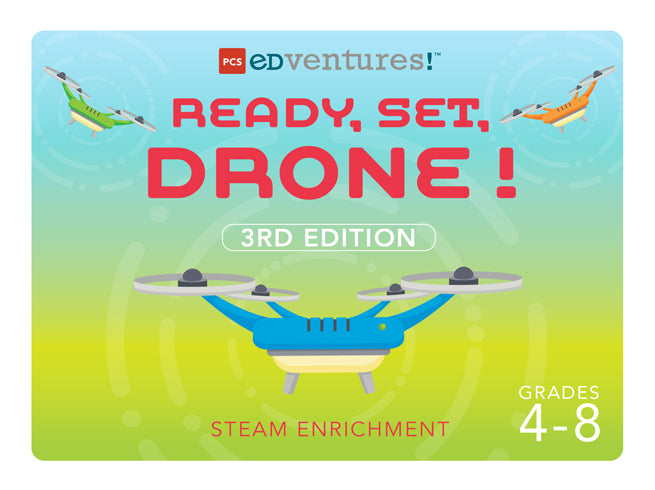
Ready, Set, Drone! 3rd Edition
Pricing Options:
- Complete Program (Materials + Curriculum): 2,995.00 USD
- Curriculum Print & Digital: 995.00 USD
- Refill Kit: 350.00 USD
- Add-On Package for Drone Designers: 2,125.00 USD
Recommended Settings:
- Summer Camps
- Classrooms
- Before & After-School Programs
- Homeschools
Tech requirements:
- Droneology Jr.: One device per student (digital curriculum is compatible with internet-connected Macs, PC’s, iPads, Android tablets
and Chromebooks.)
Curriculum Topics:
- Essential Drone Knowledge
- Flight Safety
- Basic Piloting Skills
- Drone Physics
- Drone Rules & Ethics
- Real-World Applications of Drones
Product Orientation:
- Half-hour free webinar orientation for purchases of $500+
- One-hour free webinar orientation for purchases of $1000+
- Additional training available for purchase
Complete Program Includes:
Ready, Set, Drone! 3rd Edition comes with all of the supplies needed for 30 students to complete 12 one-hour activities:
- Instructor Guide: 1
- Printed Student Pages: 30 sets
- Printed Posters: 4
- Droneology Jr. Premium Digital Course: 1
- BrickLAB BrickPACKs: 6
- Brick Separator: 1
- Mesh Bag (for cleaning bricks): 1
- Small Storage Containers: 8
- Medium Storage Containers: 2
- Large Storage Container: 1
- #2 Pencils (12 pack): 3
- Batteries (rechargeable AAA): 12
- Battery Charger: 1
- Colored Pencils (12 pack): 12
- Composition Notebooks: 30
- Flight Team Lanyards: 30
- LiPo Batteries: 12
- LiPo Battery Multi-Charger: 3
- LiPo Safe Storage Bag: 1
- Mini Quadcopters: 6
- Mini Drone Battery Charger Packs: 6
- Pencil sharpeners: 6
- Safety Glasses: 30
- Scissors: 12
- Surge Protector: 1
- Transparent Tape Dispensers: 12
- USB Charging Cables: 6
- Access to the Digital Resource Portal
Curriculum Print & Digital Includes:
- Instructor Guide: 1
- Printed Student Pages: 30 sets
- Printed Posters: 4
- Droneology Jr. Premium Digital Course: 1
- Access to the Digital Resource Portal
Refill Kit Available:
Looking to use Ready, Set, Drone! with a new flight crew? This refill kit will get you back up and flying in no time!
- Printed Student Pages: 30 sets
- #2 Pencils (12 pack): 3
- Colored Pencils (12 pack): 12
- Composition Notebooks: 30
- Drone Motors (4 pack): 1
- Propellers (4 pack): 3
- Transparent Tape Dispensers: 12
Add-On Package:
If you currently own Drone Designers 2nd Edition, this add-on package is the perfect addition to build your drone collection!
The Ready, Set, Drone! add-on package comes with all of the supplies needed for 30 students to complete 12 one-hour activities with the drones you already have:
- Instructor Guide: 1
- Printed Student Pages: 30 sets
- Droneology Jr. Premium Digital Course: 1
- BrickLAB BrickPACKs: 6
- Brick Separator: 1
- Mesh Bag (for cleaning bricks): 1
- Small Storage Containers: 8
- Medium Storage Containers: 2
- Large Storage Container: 1
- #2 Pencils (12 pack): 3
- Colored Pencils (12 pack): 12
- Composition Notebooks: 30
- Flight Team Lanyards: 30
- Pencil sharpeners: 6
- Scissors: 12
- Transparent Tape Dispensers: 12
- Access to the Digital Resource Portal
Habits of Mind:
16 thinking habits developed by Art Costa and Bena Kallick to empower students to succeed in a 21st-century learning environment.
- Applying Past Knowledge to New Situations
- Gathering Data Through All the Senses
- Managing Impulsivity
- Questioning and Posing Problems
- Remaining Open to Continuous Learning
- Taking Responsible Risks
- Thinking About Thinking
- Thinking Flexibly
- Thinking Interdependently
21st Century Skills:
A set of widely-applicable abilities essential for success in the information age.
- Communication and Collaboration
- Critical Thinking and Problem Solving
- Flexibility and Adaptability
- Information, Media and Technology Literacy
- Leadership and Responsibility
© 2019 Battelle for Kids. battelleforkids.org. All Rights Reserved. Battelle for Kids was not involved in the production of this product and does not endorse it.
Common Core State Standards for English Language Arts:
- CCSS.ELA-LITERACY.SL.4.1/CCSS.ELA-LITERACY.SL.5.1/CCSS.ELA-LITERACY.SL.6.1 Engage effectively in a range of collaborative discussions (one-on-one, in groups, and teacher-led) with diverse partners on grade 4-6 topics and texts, building on others' ideas and expressing their own clearly.
- CCSS.ELA-LITERACY.SL.4.2/CCSS.ELA-LITERACY.SL.5.2/CCSS.ELA-LITERACY.SL.6.2 Paraphrase portions of a text read aloud or information presented in diverse media and formats, including visually, quantitatively, and orally. / Interpret information presented in diverse media and formats (e.g., visually, quantitatively, orally) and explain how it contributes to a topic, text, or issue under study.
© Copyright 2010. National Governors Association Center for Best Practices and Council of Chief State School Officers. All rights reserved.
Next Generation Science Standards:*
- NGSS 3-5-ETS1-1 Engineering Design
- NGSS 3-5-ETS1-2 Engineering Design
- NGSS 3-5-ETS1-3 Engineering Design
- NGSS 4-PS3-1 Energy
- NGSS 4-PS3-2 Energy Transfer
- NGSS 5-PS1-1 Structure and Properties of Matter
- NGSS 5-PS2-1 Forces and Interactions
* Next Generation Science Standards and NGSS is a registered trademark of WestEd. Neither WestEd nor the lead states and partners that developed the Next Generation Science Standards were involved in the production of this product, and do not endorse it.
International Society for Technology in Education:
- ISTE 1d Students understand the fundamental concepts of technology operations, demonstrate the ability to choose, use and troubleshoot current technologies and are able to transfer their knowledge to explore emerging technologies.
- ISTE 2b Students engage in positive, safe, legal and ethical behavior when using technology, including social interactions online or when using networked devices.
- ISTE 7c Students contribute constructively to project teams, assuming various roles and responsibilities to work effectively toward a common goal.
ISTE Standards for Students, ©2016, ISTE® (International Society for Technology in Education), iste.org. All rights reserved. ISTE was not involved in the production of this product and does not endorse it.
PCS Edventures Development Team:
PCS Edventures programs are crafted by educators, for educators. Our development team includes educators, curriculum specialists, writers and artists from all backgrounds. Together, we create programs that close learning gaps, promote equity, meet educational standards, support social-emotional learning, explore real-world careers and instill a life-long love of STEM in learners worldwide!
With decades of combined experience in classrooms, summer camps, after-school programs and so much more, your learning environment is in great hands.
Top notch
The curriculum was very helpful with implementation of the Drones. I love the resources available at PCS Edventures
My students are always engaged when I teach the Drone Technology using PCS curriculum. They are learning and ready to fly the drones!!
It is an amazing introduction to the world of drones. It provides a complete and meaningful curriculum to a "toy" that most kids have but don't realize how to use safely.
They stay engaged and look forward to it.





